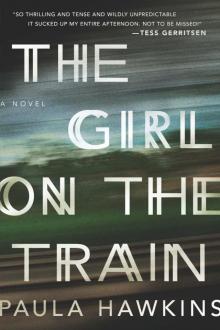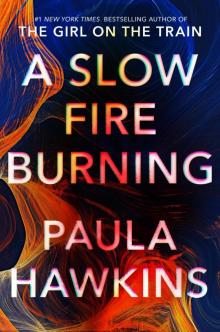- Home
- Paula Hawkins
A Slow Fire Burning Page 13
A Slow Fire Burning Read online
Page 13
On the other hand, panic: her sister was gone. So too, Daniel. And in a week’s time it would be Ben’s birthday. Would have been Ben’s birthday, had he lived. His eighteenth. Their little guy, an adult. An actual adult. Talking about going off to university, bringing home girls. Or boys. It hurt to think about, who he might have been, who they might have been, if not for the accident.
If not for Angela.
Theo had been to Carla’s home, he’d been to the graveyard, he’d called her friends. If he failed here, he might have to call the police. It had crossed his mind, more than once, that she might be with the police already. That she might be sitting in a room, right now, answering questions. Because if they’d come for his fingerprints, his DNA, then they’d have come for hers too, wouldn’t they? And what might they have found?
He knocked again, more loudly still, and called out, desperate: “For God’s sake, Carla, let me in!”
The front door of the next-door house opened a fraction. An elderly woman poked her wizened face through the crack. “There’s no one there,” she said curtly. “It’s empty.”
The nosy neighbor. Carla had mentioned her; Theo couldn’t remember her name. He beamed at her. “Oh, hello. I’m so sorry to bother you,” he said, stepping away from Angela’s front door and walking over toward the old woman. “I’m looking for my wife. Carla Myerson? She’s Angela’s sister, I was just wondering if you’d seen her at all . . . ?” She narrowed her eyes at him. “Carla?” he repeated loudly, enunciating clearly. The woman’s brow furrowed. He had the feeling she might not be quite all there. “It’s all right,” he said, smiling again, “don’t worry, never mind.”
“You,” the crone said, suddenly, pulling the door open, pointing one gnarled finger at his chest. “It was you. Of course! I should have recognized you.”
“I beg your pardon?” Theo said.
“Wait here,” she said. “Don’t go anywhere.” And off she went, disappearing down her hallway, leaving the door wide open.
Theo stood for a moment, unsure what to do. He looked up and down the street. He called out, “Hello? Mrs. . . . uh . . .” What was her name? Senile old goat, he seemed to remember Carla calling her. He stepped into her dark hallway, glancing briefly at the pictures on the walls, cheap prints, naval scenes. Perhaps the husband was into ships? He took another step farther into the house.
Suddenly, out of the gloom, she appeared, and he jumped. With a pair of glasses perched on the end of her nose she peered at him, eyes narrowing.
“It is you! You were here before, you were out in the lane, with Angela.”
“Uh, no . . . I—”
“Yes, yes, it was you. The police officer asked me who the man was and I couldn’t say, I didn’t recognize you at the time, or I didn’t remember anyway, but it was you. You were here, with Angela. You made her cry.”
“I did not,” Theo said emphatically. “You have me confused with someone else, I’m afraid.” And he turned away, heading quickly toward the main road.
“You had a dog with you!” the old lady called out behind him. “A little dog.”
* * *
Theo walked briskly along the lane, around the corner, and straight into the Sekforde Arms. He ordered himself a whiskey. He drank it swiftly and went outside to smoke. Breaking the rules, no spirits before six p.m., this cigarette disallowed under his own regime. Still. Extenuating circumstances, he thought, crushing the half-smoked cigarette against an ashtray, turning to look back down the road toward Hayward’s Place, as though the old woman might be following him.
Would she tell Carla? he wondered. Would she tell Carla that she’d seen him today, or that she’d seen him before? Jesus Christ. He went back inside and, raising a finger to the young woman behind the bar, ordered another drink. The barmaid raised an eyebrow, almost imperceptibly. Almost. Mind your own business, he wanted to say. She placed the second drink in front of him with a smile. There you go. Maybe he’d imagined the eyebrow. Maybe he was being paranoid.
Maybe he was being paranoid about the old woman too. If she did say something to Carla, then what? Would Carla even believe her? Surely it was paranoid to believe that she would—didn’t she think the old dear was losing her marbles? Wasn’t that what she’d said?
Still. What if she did believe her? What would she think? If she knew that he had been with Angela, in what direction would that take her? Impossible to tell. Theo had known Carla close to thirty years and still, he was never quite sure which way, in any given situation, she might jump. He knew this: He had forgiven her all her trespasses and would continue to do so, always. But he was by no means certain that she would reciprocate.
He pulled his mobile from his pocket and called Carla again. Still, she did not pick up. He was tempted to order another drink, but the buzz from the first was already drifting into the dangerous fog of the second, and what if she did pick up? What was he going to say then? What was he going to tell her?
* * *
The last time he’d seen Angela, they had been standing out on Hayward’s Place, where he’d just been speaking to the neighbor. A gray day, a heavy sky, all of London monochrome. Theo had been looking for Daniel, but instead he found Angela. The old woman was right, she had cried, although he wasn’t sure it was accurate to say he’d made her cry. She’d just burst into tears the moment she saw him. She invited him inside but he preferred to talk in the street. He couldn’t be in a room with her alone; he didn’t trust himself.
She looked shocking: painfully thin, spidery blue veins tracing their way through papery skin. Her hair was gray and very long; she looked like the wicked witch from a fairy tale. She looked hollowed out, a husk. Theo tried to ignore her appearance and her distress. He tried to speak to her matter-of-factly, to convey as directly as possible why he was there. That Daniel had come to his house asking for money, that he’d said he’d lost his job and had no one else to turn to. He didn’t want to bother Carla, he’d said. Theo thought that was probably a lie; he assumed there was something else at play, but he didn’t want to know what that was. Theo had written him a check for a thousand pounds. A couple of weeks later, Daniel came back—Theo was out, but he left a message.
“Can I listen?” Angela asked.
“Not on the phone,” Theo said. “He pushed it under the door.”
“What sort of note? What did it say?” Angela’s eyes were wide, the whites a jaundiced yellow. She’s ill, Theo thought. She might even be dying.
“It doesn’t matter what he said,” Theo replied. “I just need to talk to him about it.”
Angela said she didn’t know where he was, but that if she saw him, she would talk to him. “Won’t do any good,” she said, shaking her head. “He doesn’t listen to me. Carla’s the one,” she said, eyes filling with tears again. “He’ll usually do what Carla asks.”
Theo stood there for a while watching her cry; he tried to feel pity for her but failed. She clearly felt so much for herself already, his own seemed superfluous. He walked away from her before he could say something he regretted.
That wasn’t the last time he saw her, of course; that was the second to last.
EIGHTEEN
In the corners of the room, bodies formed from gathering shadows, faceless, shifting, approaching and receding, dissipating back to nothingness. Irene lay awake, listening to her breath come short and ragged in her chest, the sound of blood thick in her ears, dread weighing on her, pressing her body down into the bed.
Something had woken her. A fox in the churchyard? Or some drunkard out in the lane, shouting at nothing, or—there! No, there it was again, a sound. A creak on the stair? Irene held her breath, too afraid to reach over and turn on the light. A few seconds passed, a few more. Perhaps she had imagined it? Perhaps she had been dreaming? She exhaled, slowly, turning onto her side. There! Again! A tread. No doubt about it, and not—thankfully—on her stairs, but next doo
r. She knew the sound well; she’d listened to Angela go up and down those stairs at all hours for years.
Was it an echo she was hearing, of Angela’s footsteps? Was this a normal response to grief, just like her visions of William, coming whistling along the lane in the evenings or standing over by the window when she woke, always on the point of turning, always on the point of saying, Fancy a cuppa, Reenie?
Around the edges of her vision, something moved; Irene gripped the bedcover so tightly her fingers ached.
How would Angela appear to her, Irene wondered, if she came? Would she be herself, always a little jittery, her knee forever bouncing as she sat, one skinny leg crossed over the other, chatting about the book she’d just finished, her hands always working away at something, rolling a cigarette or pulling at a thread from her linen shirt? Would she be herself, or would she be something else, would she come crooked, her neck broken, her sweet wine breath mingling with rot?
Then—there was no doubt about this now—Irene heard someone walk along the corridor on the other side of the partition wall. A soft tread, not like Angela’s drunken shuffle, and not some muffled, indistinct, imagined noise, but footsteps. Careful and unmistakable.
There was someone next door, and it was not a ghost. It was an intruder. More than most things, Irene dreaded an intruder. She dreaded the moment at which the intruder would realize that there was someone home, a witness they would have to deal with. She dreaded the moment of reckoning, the moment at which she, the frail pensioner alone in bed, would come to understand the sort of intruder this was: an opportunist, out to snatch a wallet or a laptop computer, or something else. Someone in search of a plaything. Those terrible, pitiful stories you heard, of old ladies beaten, assaulted, eyes blackened, nightdresses soiled.
There, again! Another noise, someone moving back and forth, perhaps, along the corridor. Looking for something? Myerson, Irene thought. The man who’d made Angela cry. The man who’d lied about having ever been there at all. She’d not liked the look of him at all, not liked the way his eyes slid over her, underestimating her all the while. Stupid old fool, he’d thought. She could almost hear him muttering. Nosy old cow.
Well. She might as well fulfill her curtain-twitching destiny, then, mightn’t she? She felt in the darkness for the light switch and clicked on the lamp, blinking as her eyes adjusted to the light. Maneuvering herself into a sitting position, she reached for her spectacles. Her mobile phone, inevitably, was not next to her bed. The blasted phone was never where she needed it to be; no matter where she was or what she was doing, it was always in another room.
She crept down the stairs, feeling her way along the stairwell in the dark, not wanting to attract attention by turning on the downstairs lights. Stupid, she muttered to herself. Blundering around in the darkness—never mind twisting an ankle, you’ll break a hip.
As Irene reached the last step, as carefully she tested with one slippered foot that she had quite definitely reached the ground floor, she heard from next door a louder sound, a sudden whump! as though someone had stumbled, and she cried out, “Who is that? I can hear you. I’m calling the police! The police are coming!” She sounded laughably indignant, even to her own ears. “Do you hear me?”
Silence answered.
* * *
Two police officers, one young, stocky, fresh-faced, the other older, a woman in her thirties, weary-looking, stood outside Angela’s house, hands on hips. “The door’s locked,” the stocky one told Irene. He tried the door handle again, just to show her. “No sign of anyone tampering with it. No sign of any damage to the windows.” He shrugged, apologetic. “There’s no sign of a break-in.”
“There’s someone in there,” Irene, shuffling over to join the police officers, insisted. “I heard them. I heard them walking around.”
“And you say the house is empty? You’re sure it hasn’t been rented out?”
“No, it’s definitely empty, they haven’t even finished clearing it, and the thing is, there was a man here today, and he lied about the fact he’d been here before, and I just . . . I just . . .”
The woman pursed her lips. “So, someone’s been hanging around the property, then?”
“Well . . . no, that’s not what I’m saying, but a woman died here. A couple of months ago, a woman died, and you . . . not you, but the police, said it was an accident, only I’m not sure that’s right, because now the son’s died, and doesn’t that seem strange to you?”
The woman blinked, slowly. “Sorry,” she said, “you’re saying there have been two suspicious deaths at the property?”
“No, no, only one, the son died somewhere else. . . . I just . . . I’m not some time waster,” Irene said. “But there’s someone next door, and . . . frankly, I’m frightened.”
The stocky one nodded. “Right you are,” he said, giving Irene a smile. He raised his fist and thumped it firmly against the door. They all waited. He thumped again. And then a light came on.
Irene almost fell over the policewoman in her haste to back away from the door. “There is someone there!” she cried, at once terrified and triumphant. A few moments later, the door swung open, and there stood Carla, her expression thunderous.
* * *
Later, after they’d sorted everything out with the police, after Carla had explained who she was and how she’d every right to be there, she accepted Irene’s offer of a three a.m. cup of tea. “You shouldn’t be crashing around in there,” Irene said to her, aggrieved. “Not in the middle of the night.”
“With respect, Irene . . .” As Carla accepted a mug of tea she raised her chin a little, so that she was looking down the bridge of her nose as she spoke. “I can go there whenever I want. It’s my house. I mean, it will be. So I will go there whenever it suits me.”
“But—”
“I’m sorry I disturbed you,” Carla went on, her tone betraying not one iota of contrition, “but I’ve been sleeping badly, if at all, of late, and so sometimes instead of lying in bed staring at the ceiling, I get up and I get on with things, whether that be correspondence, or cleaning, or in this case coming here to look for something I mislaid earlier—”
“What?” Irene snapped, infuriated by Carla’s manner, by her blithe disregard for Irene’s peace of mind. “What on earth did you need so urgently at two o’clock in the morning?”
“None of your business!” Carla slammed her mug down on the kitchen counter, spilling tea onto the floor. “Sorry,” she said, and she reached for a sheet of kitchen towel, crouched down to mop up the spill. “God!” She stayed down there, crouched over, her arms hanging loose at her sides, her face pressed against her knees. “I’m sorry,” she mumbled. “I’m sorry.”
Irene reached out a hand, placed it gently on Carla’s shoulder. “It’s all right,” she said, taken aback, a little, by this display of weakness. “Come on, up you come.”
Carla stood. She was crying—not loudly, or demonstratively, but in a quiet, dignified, Carla sort of way—tears sliding elegantly down her cheeks, dripping from her jawline onto the collar of her crisp white shirt. She closed her eyes and pressed the heels of her hands against her cheekbones.
“Come on now,” Irene said gently, coaxing her, as though she were an animal, or a small child. “Take your tea, there, that’s right,” she said, and she led Carla from the kitchen to the living room, where they sat, side by side, on the sofa.
“I had some things,” Carla said after a while, “in a bag. Some clothes and a couple of jewelry boxes. I had them with me when I came here today—I mean, yesterday—whenever it was. I’m sure I did.”
“And now you can’t find them?”
Carla nodded.
“They were . . . valuable?”
Carla shrugged. “Not terribly. I don’t know . . . my mother’s engagement ring, that’s probably worth a bit, but the medal, a Saint Christopher . . . It belonged to my son.�
�
“Oh, Carla.”
“I can’t lose it, I can’t, we bought it for his christening, we had it engraved. . . .” She shook her head, blinking away tears. “He never wore it, of course, he was too little, but he loved to look at it, to get it out of the box, he wanted to play with it, you know how kids are. But I always said that he couldn’t keep hold of it, that it was precious, that he had to put it away, and that I would look after it for him, I would keep it safe for him. . . . I promised to keep it safe for him, and I did, for all this time, and now—” She broke off, turning her face away.
“Oh, I’m so sorry,” Irene said. “But why bring it to the house—were you on your way somewhere? Did you stop off anywhere, perhaps? A shop, perhaps you set them down . . . ?”
“No, no. I didn’t go anywhere else. I was just . . . I wanted them with me, those things. I wanted them with me. . . .” She turned her head away.
“You wanted them with you?” Irene didn’t understand.
“I was . . . I was in despair,” Carla said. She turned back and their eyes met.
Irene’s hand flew to her mouth. She understood now. “Oh, Carla,” she said. “Oh no.”
Carla shook her head again. “It doesn’t matter,” she said. “It doesn’t matter.”
“It matters. Of course it does.” Irene rested her hand gently on top of Carla’s. “Your son, and then your sister and Daniel, so close together—it feels like too much to bear.”
Carla smiled, withdrawing her hand, wiping the tears from her cheeks. “We’ve not had much luck,” she said.
“You’re grieving,” Irene said. “You can’t think straight when you’re grieving. I was the same when I lost my husband, I thought about it. Putting an end to it. There didn’t seem much point in going on, just me, you know, no one else. Your sister pulled me out of it, you know. She just kept coming round, bringing those little pastries she liked, the almond ones, Swedish? Danish, that’s it, or sometimes some soup, or just coffee, whatever, and she’d be chattering away, about what she was reading, you know, that sort of thing. She saved my life, Angie did.” Carla’s face seemed to darken; she turned her head away. “I know that things weren’t always good between you and her, but she loved you,” Irene said. “And . . . well, I know you loved Daniel, didn’t you, he meant a great deal—”

 Girl on the Train
Girl on the Train The Girl on the Train
The Girl on the Train Into the Water
Into the Water A Slow Fire Burning
A Slow Fire Burning